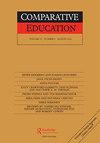Field-crossing social capital and patronage as cornerstones of the transnational OECD-PISA network infrastructure
IF 3.7
1区 教育学
Q1 EDUCATION & EDUCATIONAL RESEARCH
引用次数: 0
Abstract
ABSTRACT The OECD is a key player in global education policy advice and part of the edu-business network. This network comprises of companies, philanthropies, consulting agencies and think tanks profiting from educational governance reforms and large-scale testing. This article investigates the structure of the OECD global policy network and its capability to bring together different types of expertise. To map the global policy advisors network, we introduce the concepts of boundary-spanning actors and field-crossing social capital. Using network analysis, we apply these concepts to investigate the embeddedness of the OECD in different social fields and the global field of power. Our findings indicate that the global network of policy advisors coordinates different forms of expertise by installing a system of patronage, consisting of a small number of key players and large numbers of actors that set education reforms in motion. We exemplify this result with McKinsey & Company.跨领域的社会资本和赞助是跨国OECD-PISA网络基础设施的基石
本文章由计算机程序翻译,如有差异,请以英文原文为准。
求助全文
约1分钟内获得全文
求助全文
来源期刊

Comparative Education
EDUCATION & EDUCATIONAL RESEARCH-
CiteScore
7.40
自引率
21.20%
发文量
35
期刊介绍:
This international journal of educational studies presents up-to-date information with analyses of significant problems and trends throughout the world. Comparative Education engages with challenging theoretical and methodological issues - and also considers the implications of comparative studies for the formation and implementation of policies - not only in education but in social, national and international development. Thus it welcomes contributions from associated disciplines in the fields of government, management, sociology - and indeed technology and communications - as these affect educational research and policy decisions.
 求助内容:
求助内容: 应助结果提醒方式:
应助结果提醒方式:


